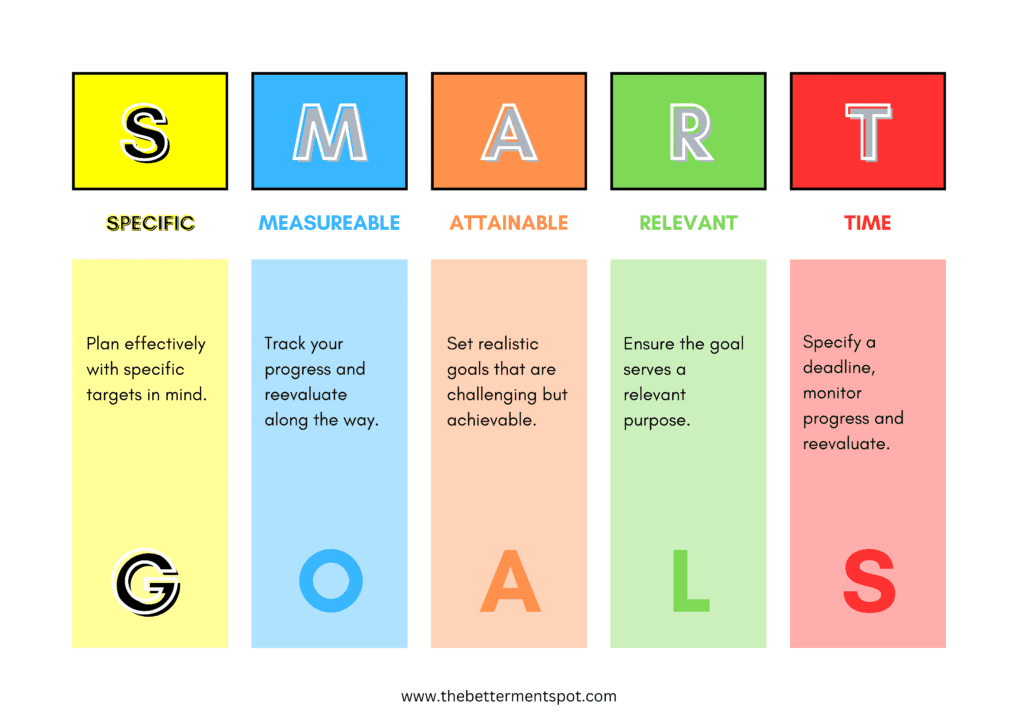
![]() n today’s challenging job market, a well-defined career development plan is essential for long-term success. These goals act as a compass, empowering individuals to navigate their professional journey with purpose and intention. By establishing and pursuing these objectives, you can enhance your skills, broaden your opportunities, and experience meaningful personal and career growth. Setting clear career development goals unlocks a world of possibilities and sets the stage for a fulfilling and successful future in your chosen field.
n today’s challenging job market, a well-defined career development plan is essential for long-term success. These goals act as a compass, empowering individuals to navigate their professional journey with purpose and intention. By establishing and pursuing these objectives, you can enhance your skills, broaden your opportunities, and experience meaningful personal and career growth. Setting clear career development goals unlocks a world of possibilities and sets the stage for a fulfilling and successful future in your chosen field.
Understanding Career Development Goals
Career development goals refer to the specific objectives individuals set for themselves to advance their professional trajectory. These goals can vary in nature and scope, ranging from short-term targets to long-term ambitions. By identifying and actively working towards career development goals, individuals gain clarity, motivation, and direction in their careers.
The Benefits of Setting Career Development Goals
Setting career development goals offers several advantages that contribute to personal and professional growth. Firstly, it provides focus and direction, helping you make deliberate choices that align with your ambitions. Secondly, pursuing these goals increases motivation and job satisfaction, as you experience fulfillment and progress. Additionally, career development goals stimulate continuous learning, ensuring relevance in a rapidly evolving workplace.
Types of Career Development Goals
- Short-term Goals: Acquiring Immediate Advancements
Short-term goals are designed to be achieved within a brief period, typically six months to a year. These goals often focus on acquiring specific skills, completing training programs, or accomplishing tasks that contribute to immediate career advancement.
- Long-term Goals: Envisioning Your Ultimate Success
Long-term goals encompass broader, overarching career aspirations that extend beyond the immediate future. These goals involve envisioning your desired position, industry, or level of professional success in the long run. Careful planning and understanding of the necessary steps are required to reach your ultimate career destination.
- Skill-based Goals: Enhancing Your Competencies
Skill-based goals revolve around developing or improving specific competencies relevant to your desired career path. Enhancing technical skills, mastering leadership abilities, improving communication capabilities, or gaining expertise in a specialized area are examples of skill-based goals.
- Promotion Goals: Climbing the Corporate Ladder
Promotion goals are centered around advancing to higher positions within your current organization or seeking opportunities for growth and increased responsibilities elsewhere. These goals often require skill-building, demonstrating value to employers, and actively pursuing promotional opportunities.

Steps to Setting Effective Career Development Goals
To ensure that your career development goals are meaningful, achievable, and aligned with your professional aspirations, follow these steps:
- Self-assessment: Identify Your Strengths and Areas for Improvement
Begin by conducting a thorough self-assessment to identify your strengths, weaknesses, passions, and areas for improvement. Reflect on your skills, interests, and values to understand what you want in your career.
- Identify Areas of Improvement: Focus on Skill Enhancement
Based on your self-assessment, identify specific areas where you want to enhance your capabilities or acquire enhanced skills. Consider the knowledge and competencies vital to success in your desired field or position.
- Set Specific and Measurable Goals: Define Clear Objectives
Formulate clear and measurable goals specific to your career aspirations. Avoid vague or generic statements and instead focus on specific outcomes you wish to achieve. For example, instead of setting a goal to “improve communication skills,” specify a goal such as “deliver effective presentations to large audiences.”
- Create an Action Plan: Break Goals into Actionable Steps
Break down your goals into actionable steps and create a detailed action plan. Identify the tasks, resources, and timelines required to achieve each goal. A well-structured plan will provide a roadmap for your career development journey.
- Seek Feedback and Monitor Progress: Gain Insights and Stay on Track
Share your goals with trusted colleagues, mentors, or supervisors and seek their feedback. Their insights can offer valuable perspectives and refine your goals. Keep an eye on your progress, track key milestones, and make adjustments to stay on track.
Strategies to Achieve Career Development Goals
Setting goals is just the first step; implementing effective strategies is vital for achieving them. Here are some strategies to help you achieve your career development goals:
- Continuous Learning: Stay Ahead in Your Field
Embrace a growth mindset and invest in continuous learning. Stay updated with industry trends, attend relevant workshops or conferences, and pursue professional development opportunities. This commitment to learning will enhance your skill set and keep you ahead in your field.
- Networking and Mentorship: Build Relationships and Gain Insights
Build a strong professional network and seek guidance from experienced mentors. Networking can expose you to new opportunities, while mentors can offer valuable advice, share their experiences, and provide insights that can accelerate your career growth.
- Seize Professional Development Opportunities: Enhance Your Skills
Take advantage of internal or external professional development programs offered by your organization or industry association. These programs often provide specialized training, coaching, or resources that contribute to your skill development and enhance your employability.
- Embrace Challenges: Expand Your Comfort Zone
Step out of your comfort zone and embrace challenging projects or assignments. By taking on new responsibilities, you can expand your skill set, increase your confidence, and open doors to further advancement.
Overcoming Obstacles and Challenges
While pursuing your career development goals, you may encounter obstacles along the way. Here are some common challenges and strategies to overcome them:
- Lack of Resources: Seeking Alternative Solutions
Limited access to resources such as time, finances, or educational opportunities can pose challenges. Look for alternative solutions, such as online courses, free resources, or leveraging your existing network to acquire the necessary resources.
- Time Management: Prioritize and Optimize Productivity
Balancing work, personal life, and career development goals can be challenging. Prioritize your activities, delegate tasks when possible, and practice effective time management techniques to optimize your productivity.
- Work-Life Balance: Establishing Boundaries and Self-Care
Maintaining a healthy work-life balance is essential for overall well-being. Set boundaries, prioritize self-care, and establish clear communication with your employer and loved ones to ensure you have time and energy to focus on your career development goals.
- Dealing with Setbacks: Viewing Challenges as Opportunities
Setbacks and failures are part of the journey. Instead of getting discouraged, view setbacks as opportunities for growth and learning. Analyze what got wrong, make the necessary adjustments, and persevere in pursuing career development goals.
Monitoring and Evaluating Progress
Regularly monitoring and evaluating your progress is essential to ensure you are on track and making meaningful strides toward your career development goals. Consider the following practices:
- Tracking Milestones: Celebrate Achievements and Stay Motivated
Break down your goals into smaller milestones and track your progress towards each milestone. Celebrate achievements along the way to stay motivated and reinforce your commitment to your goals.
- Reflecting on Achievements: Gain Insights and Identify Areas for Improvement
Take time to reflect on your achievements and lessons learned. Reflection allows you to gain valuable insights, recognize your growth, and identify areas for further improvement.
- Make the Necessary Adjustments: Stay Flexible and Adaptable
Stay flexible and adaptable. If you encounter unforeseen circumstances or find that your goals need adjustments, be willing to make the necessary changes to align with your evolving aspirations and circumstances.
The Importance of Revisiting and Updating Goals
As your career evolves, it is crucial to revisit and update your goals periodically. Changes in the industry landscape, personal circumstances, or shifts in your aspirations may warrant adjustments to your career development goals. Regularly reassess your goals to ensure they remain relevant and in alignment with your professional journey.
Conclusion
Setting career development goals is a powerful tool for professional growth. By defining clear objectives, formulating strategies, and persevering through challenges, you can shape your career trajectory and unlock new opportunities. Remember, career development requires continuous learning, adaptability, and self-reflection. Invest in yourself, stay committed, and witness the transformative impact on your professional life.
Frequently Asked Questions (FAQ’s)
Q1. How often should I revisit my career development goals?
It is recommended to revisit your career development goals at least once a year. However, you can adjust the frequency based on significant changes in your career or personal life.
Q2. Can I have multiple career development goals simultaneously?
Yes, you can have multiple career development goals simultaneously. However, ensure that they are manageable and do not overwhelm you. Prioritize your goals and allocate time and resources accordingly.
Q3. What if I face difficulties in achieving my career development goals?
Difficulties are part of the journey. Seek support from mentors or colleagues, learn from setbacks, and consider revisiting and adjusting your goals if necessary. Persistence and resilience are key to overcoming challenges.
Q4. Are short-term goals as important as long-term goals in career development?
Yes, short-term goals are as important as long-term goals. Short-term goals provide immediate focus and help you build momentum towards your long-term vision. They contribute to your overall growth and progress.
Q5. How can networking contribute to career development goals?
Networking can open doors to new opportunities, expose you to different perspectives, and help you build valuable professional relationships. Through networking, you can gain insights, receive mentorship, and discover potential career advancements.





